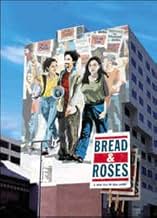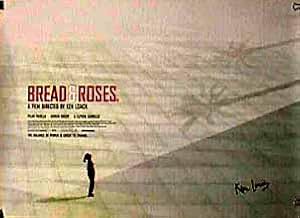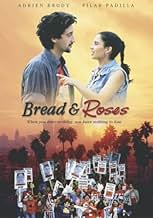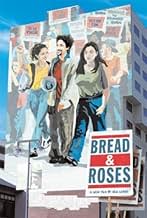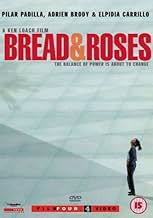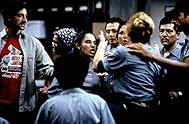IMDb-BEWERTUNG
7,0/10
6293
IHRE BEWERTUNG
Zwei lateinamerikanische Schwestern arbeiten als Putzfrauen in einem Bürogebäude im Stadtzentrum und kämpfen für das Recht, sich gewerkschaftlich zu organisieren.Zwei lateinamerikanische Schwestern arbeiten als Putzfrauen in einem Bürogebäude im Stadtzentrum und kämpfen für das Recht, sich gewerkschaftlich zu organisieren.Zwei lateinamerikanische Schwestern arbeiten als Putzfrauen in einem Bürogebäude im Stadtzentrum und kämpfen für das Recht, sich gewerkschaftlich zu organisieren.
- Auszeichnungen
- 5 Gewinne & 10 Nominierungen insgesamt
Frankie Davila
- Luis
- (as Frank Davila)
Eloy Méndez
- Juan
- (as Eloy Mendez)
Empfohlene Bewertungen
Same typical themes handled in Loach's work. I felt something strange, while watching it, maybe the San Diegan locations might be strange to the fans used to seeing English and Scottish cities. Nevertheless I couldn't say the effort of observation and insight doesn't work; the young Mexican gal propelled by the American dream is very believable, the unknown cast acts with passion, expressing the various faces of injustice and biases migrants must endure. However, my final opinion on the movie is that it fails to illustrate the real situations these kind of people live in and their genuine feelings, that is the Ken Loach's peculiarity.
When I attended a screening a week ago sponsored by a local public supported radio station (KPFK) in Los Angeles, I was not certain if this film was a documentary or typical crafted Hollywood-style hyperbole since I listened with half an ear while jogging and listening to an opportunity to attend.
Who would have thought that a simple discussion on a local public supported radio station in Los Angeles (KPFK) a few years ago would compel a screenwriter (Paul Laverty) to visit a union organizing effort in downtown Los Angeles (circa 1999) resulting in a film that was drama, comedy, farce, fear, compassion and a taste of dusted immigrants creeping through Tijuana-to-USA shrubs to gain entry via the abusive "coyotes" human smuggler routes. Most of these immigrants land in day-worker situations and low pay and yet Los Angeles would collapse without them. This film concentrates on the downtown office area -- owned and occupied by the elite of Los Angeles establishment - and where many undocumented workers toil under conditions that are far less than that suggested by international Human Rights standards.
This was a polished non-Hollywood-capability-film but yet intimately Los Angeles. I listened to an interview yesterday on KPFK with Laverty and learned that funding was elsewhere - Europe I recall - not 'Hollywood'. And Laverty is from Scotland. One would never guess that the film was actually on the low-budget scale when compared with Hollywood's pleasure to spend big dollars.
I also learned that the film was made in 30-days (hence the vibrant interaction of all cast members and energetic direction by Loach) and is in release this week with 30 prints in Los Angeles, and 300 nationwide USA. Sounds like some symmetry there and potential Lottery pick permutations.
My only reservation is that the story is highly political in an undercurrent nature and may frighten an extensive audience --- unless the viewers just take the courage to go, watch, and enjoy. The film will do the rest. The viewer will leave with more than the cost of a matinee price ticket.
I also suggest that in an upcoming meeting between Vicente Fox, President of Mexico, and George W. Bush, President of United States, that Vicente snag a copy of the film and show it to George while sipping tea in Texas. And then for dessert, sip more tea and watch "Traffic".
Who would have thought that a simple discussion on a local public supported radio station in Los Angeles (KPFK) a few years ago would compel a screenwriter (Paul Laverty) to visit a union organizing effort in downtown Los Angeles (circa 1999) resulting in a film that was drama, comedy, farce, fear, compassion and a taste of dusted immigrants creeping through Tijuana-to-USA shrubs to gain entry via the abusive "coyotes" human smuggler routes. Most of these immigrants land in day-worker situations and low pay and yet Los Angeles would collapse without them. This film concentrates on the downtown office area -- owned and occupied by the elite of Los Angeles establishment - and where many undocumented workers toil under conditions that are far less than that suggested by international Human Rights standards.
This was a polished non-Hollywood-capability-film but yet intimately Los Angeles. I listened to an interview yesterday on KPFK with Laverty and learned that funding was elsewhere - Europe I recall - not 'Hollywood'. And Laverty is from Scotland. One would never guess that the film was actually on the low-budget scale when compared with Hollywood's pleasure to spend big dollars.
I also learned that the film was made in 30-days (hence the vibrant interaction of all cast members and energetic direction by Loach) and is in release this week with 30 prints in Los Angeles, and 300 nationwide USA. Sounds like some symmetry there and potential Lottery pick permutations.
My only reservation is that the story is highly political in an undercurrent nature and may frighten an extensive audience --- unless the viewers just take the courage to go, watch, and enjoy. The film will do the rest. The viewer will leave with more than the cost of a matinee price ticket.
I also suggest that in an upcoming meeting between Vicente Fox, President of Mexico, and George W. Bush, President of United States, that Vicente snag a copy of the film and show it to George while sipping tea in Texas. And then for dessert, sip more tea and watch "Traffic".
As the daughter of hard-working Mexican immigrant parents and having been raised in one of Los Angeles' poorest barrios, I often saw the story of Rosa and Maya being played out in real life within my family and amongst my neighbors. The authenticity with which this story is told is astounding, showing a deep respect for those who in search of a way to make an honest living, subject themselves to countless humiliations and are relegated to live outside the margins of mainstream America.
Kudos to the writers!! This is the first time I have ever seen an American film in which the dialogue in Spanish was written by someone who actually speaks the language and can grasp the nuances and feeling of the language so perfectly. Richard Hicks is to be commended for casting both Elpidia Carrillo and Pilar Padilla in the roles of Rosa and Maya, respectively. They deliver their dialogue, especially in Spanish, with an emotion and passion that is rarely seen on the Hollywood silver screen. Needless to say, Bread and Roses is now on my list of must-have-films to add to my DVD library.
Kudos to the writers!! This is the first time I have ever seen an American film in which the dialogue in Spanish was written by someone who actually speaks the language and can grasp the nuances and feeling of the language so perfectly. Richard Hicks is to be commended for casting both Elpidia Carrillo and Pilar Padilla in the roles of Rosa and Maya, respectively. They deliver their dialogue, especially in Spanish, with an emotion and passion that is rarely seen on the Hollywood silver screen. Needless to say, Bread and Roses is now on my list of must-have-films to add to my DVD library.
I don't know why but I've always had good interactions with janitors. Why should there be a reason? I respect their jobs: if a floor is shiny from having just been cleaned, I wouldn't dare stick my muddy shoes on it. Just like 'garbage men' these people's jobs consist of handling 'unwanted' stuff but unlike what Luis (Frank Davila) said, I don't think their uniform make them invisible, it is just that the world has turned so competitive and greed-driven that we all keep our chins up to get a share on the dream without caring much from the reality lying beneath us.
And it takes directors like Ken Loach to open our eyes on such realities, "Bread and Roses" -whose title derives from a poem turned into union slogan for industrial (lowly paid) workers- sheds the lights on the working conditions of janitors in Los Angeles, mostly South American immigrants who're not even acknowledged a right to unionize or get insurance. It's not about what you can do for a job but also what a job can do for you. But obviously, these people are at the bottom of the social pyramid and should value their luck for having wages, wages of fear or wages of wrath, wages anyway.
And so Loach provides a sort of behind-the-scenes look on the struggle of these unglamorous people who dance with the vacuum cleaner and empty our wastebaskets. It's not exactly a leftist tribute to the working man but a social commentary and a human study on the way they're often overlooked even by Hollywood itself. Indeed, go give me a film about maids or janitors that is not a Cinderella story. In "Bread and Roses", we look at janitors beyond their uniforms, they have kids, they have daily strugles to deal with, they have dreams too like Luis who wants to become a lawman. They are different: some are political, some don't care, it's not your monolithic group and Loach never tries to pull a Capra on his material.
The heroine is Maya (Pilar Padilla) who gets a job as a janitor from her sister Rosa (Elpidia Carilla) , both women are strong in different ways. Maya is a plucky little woman who illegally enters the territory, it's interesting that Loach teases us by not allowing the human traffickers to let her go join Rosa because she didn't give enough money. Five minutes later, she'll be back but there was one scene needed to introduce Maya as resourceful, funny and capable to survive, I won't spoil it, it's both funny and realistic, and she's pretty enough to lure any guy into it, better use the power you got. That character-establishing moment works because we do believe she can spend hours wandering around her building waiting for someone to connect to, work as a waitress and have great come-backs to some macho slurs.... then get a janitor's ob and even do an elevator prank her very first day. Such girls can get away with it.
Rosa has more years behind her, more experience, she's got a sick husband (Jack McGee) and a daughter, she could have used a line from another 2000s film "I have a family, I don't have the luxury of principles". Rosa knows it's not that the job offers enough to live, but that no job at all would just make living impossible, and when you have kids or a man who needs an operation, you'd be likely to kick any Ivy League long-haired "union" propagandist off your house. Sam Shapiro is that guy, he is introduced in a funny almost cartoonish way, trying to escape from three men, you've got to have the makings of a true con artist and in some funny twist, his methods match Maya's own resourceful nature. It's obvious from the start that a woman like Maya will be more receptive to the cause lead by Sam, both actors have great chemistry.
But it's a lost cause for Rosa, even when submitted paycheck from 1982 workers revealing that wages have decreased and right for health insurance cut out (that's the paper Sam retrieves) she refuses to hear the truth. In a way she agrees with Sam: big corporations will always win because workers depend more on their jobs than they do on workers. It's a psychological arm-wrestling and the solution doesn't come from a magic hat but for pressure, harassment and some media bait-and-switch stunts. Loach never makes the nerdy Brody a romantic Robin Hood but an overly idealistic protester ignorant of some harsh realities. In fact the other side has a convincing representative in chief of staff Perez (George Lopez) who tells workers: . "Join the union and they'll ask your papers and tax your money".
The central figure remains Rosa who has one of the greatest moments in a Loach film when she explains why she has no scruples betraying the workers, revealing to Mata that it didn't take just money to get her on the other side of the border as she had to cross her own existential border toi., something that make female worker even more subjected to a new form of slavery. The dynamics of the film operate in a way that never indulges to black vs white exposition. Loach reckons the social reality through scenes of sheer anger, constructive debates and a remarkable moment when they act as party-poopers in a little Hollywood celebration featuring some real actors like Tim Roth or Ron Perlman..
The scenes works as a subtle little jab at Hollywood, a close neighbor to Los Angeles. Now, let me pay tribute to Sasheen Littlefeather who just passed away. What Brando said about her being booed and taken off stage sums up the spirit of that scene and the whole janitor's fight: "they're ruining our fantasy with a little intrusion of reality". In "Bread and Roses", Loach allowed reality to intrude itself with bravura and gusto... mucho gusto!
And it takes directors like Ken Loach to open our eyes on such realities, "Bread and Roses" -whose title derives from a poem turned into union slogan for industrial (lowly paid) workers- sheds the lights on the working conditions of janitors in Los Angeles, mostly South American immigrants who're not even acknowledged a right to unionize or get insurance. It's not about what you can do for a job but also what a job can do for you. But obviously, these people are at the bottom of the social pyramid and should value their luck for having wages, wages of fear or wages of wrath, wages anyway.
And so Loach provides a sort of behind-the-scenes look on the struggle of these unglamorous people who dance with the vacuum cleaner and empty our wastebaskets. It's not exactly a leftist tribute to the working man but a social commentary and a human study on the way they're often overlooked even by Hollywood itself. Indeed, go give me a film about maids or janitors that is not a Cinderella story. In "Bread and Roses", we look at janitors beyond their uniforms, they have kids, they have daily strugles to deal with, they have dreams too like Luis who wants to become a lawman. They are different: some are political, some don't care, it's not your monolithic group and Loach never tries to pull a Capra on his material.
The heroine is Maya (Pilar Padilla) who gets a job as a janitor from her sister Rosa (Elpidia Carilla) , both women are strong in different ways. Maya is a plucky little woman who illegally enters the territory, it's interesting that Loach teases us by not allowing the human traffickers to let her go join Rosa because she didn't give enough money. Five minutes later, she'll be back but there was one scene needed to introduce Maya as resourceful, funny and capable to survive, I won't spoil it, it's both funny and realistic, and she's pretty enough to lure any guy into it, better use the power you got. That character-establishing moment works because we do believe she can spend hours wandering around her building waiting for someone to connect to, work as a waitress and have great come-backs to some macho slurs.... then get a janitor's ob and even do an elevator prank her very first day. Such girls can get away with it.
Rosa has more years behind her, more experience, she's got a sick husband (Jack McGee) and a daughter, she could have used a line from another 2000s film "I have a family, I don't have the luxury of principles". Rosa knows it's not that the job offers enough to live, but that no job at all would just make living impossible, and when you have kids or a man who needs an operation, you'd be likely to kick any Ivy League long-haired "union" propagandist off your house. Sam Shapiro is that guy, he is introduced in a funny almost cartoonish way, trying to escape from three men, you've got to have the makings of a true con artist and in some funny twist, his methods match Maya's own resourceful nature. It's obvious from the start that a woman like Maya will be more receptive to the cause lead by Sam, both actors have great chemistry.
But it's a lost cause for Rosa, even when submitted paycheck from 1982 workers revealing that wages have decreased and right for health insurance cut out (that's the paper Sam retrieves) she refuses to hear the truth. In a way she agrees with Sam: big corporations will always win because workers depend more on their jobs than they do on workers. It's a psychological arm-wrestling and the solution doesn't come from a magic hat but for pressure, harassment and some media bait-and-switch stunts. Loach never makes the nerdy Brody a romantic Robin Hood but an overly idealistic protester ignorant of some harsh realities. In fact the other side has a convincing representative in chief of staff Perez (George Lopez) who tells workers: . "Join the union and they'll ask your papers and tax your money".
The central figure remains Rosa who has one of the greatest moments in a Loach film when she explains why she has no scruples betraying the workers, revealing to Mata that it didn't take just money to get her on the other side of the border as she had to cross her own existential border toi., something that make female worker even more subjected to a new form of slavery. The dynamics of the film operate in a way that never indulges to black vs white exposition. Loach reckons the social reality through scenes of sheer anger, constructive debates and a remarkable moment when they act as party-poopers in a little Hollywood celebration featuring some real actors like Tim Roth or Ron Perlman..
The scenes works as a subtle little jab at Hollywood, a close neighbor to Los Angeles. Now, let me pay tribute to Sasheen Littlefeather who just passed away. What Brando said about her being booed and taken off stage sums up the spirit of that scene and the whole janitor's fight: "they're ruining our fantasy with a little intrusion of reality". In "Bread and Roses", Loach allowed reality to intrude itself with bravura and gusto... mucho gusto!
I have a deep sympathy & connection with this movie, because two of my dearest friends were Spanish-speaking cleaners in the UK (although completely legally). Now - through ridiculously hard work and frugal living - they are bilingual, educated, skilled, and making a decent life back in their home country, where I hope to visit them one day.
As such, I can tell you that this film is so true-to-life it brought tears to my eyes. It also has moments of laughter and comedy, and an extremely important message to anyone working for low wages and low respect, and an equally important kick up the backside to people like me who never think we're paid enough, and forget about the 'invisible' people earning half our wages for doing twice the workload.
The actors (many of them cleaners in real life) are never less than excellent, and you have no trouble believing every scene. I encourage anyone to watch this movie, as it has an almost Shawshank-like feelgood factor, but is much more poignant and relevant than even that great film.
The additional programme on the DVD is not as informative as I expected (being more 'fly-on-the-wall' than documentary), but still packs a powerful emotional punch, and really adds to your appreciation of the reality behind the movie.
As such, I can tell you that this film is so true-to-life it brought tears to my eyes. It also has moments of laughter and comedy, and an extremely important message to anyone working for low wages and low respect, and an equally important kick up the backside to people like me who never think we're paid enough, and forget about the 'invisible' people earning half our wages for doing twice the workload.
The actors (many of them cleaners in real life) are never less than excellent, and you have no trouble believing every scene. I encourage anyone to watch this movie, as it has an almost Shawshank-like feelgood factor, but is much more poignant and relevant than even that great film.
The additional programme on the DVD is not as informative as I expected (being more 'fly-on-the-wall' than documentary), but still packs a powerful emotional punch, and really adds to your appreciation of the reality behind the movie.
Wusstest du schon
- WissenswertesPrior to filming, Adrien Brody did undercover research as a union member in Los Angeles. He went to conventions and sat in on strike talks. A couple of the members recognized him, but Brody persuaded them not to blow his cover.
Top-Auswahl
Melde dich zum Bewerten an und greife auf die Watchlist für personalisierte Empfehlungen zu.
- How long is Bread and Roses?Powered by Alexa
Details
- Erscheinungsdatum
- Herkunftsländer
- Offizieller Standort
- Sprachen
- Auch bekannt als
- Brot und Rosen
- Drehorte
- Produktionsfirmen
- Weitere beteiligte Unternehmen bei IMDbPro anzeigen
Box Office
- Bruttoertrag in den USA und Kanada
- 533.479 $
- Eröffnungswochenende in den USA und in Kanada
- 49.662 $
- 13. Mai 2001
- Weltweiter Bruttoertrag
- 706.876 $
- Laufzeit1 Stunde 50 Minuten
- Farbe
- Sound-Mix
- Seitenverhältnis
- 1.85 : 1
Zu dieser Seite beitragen
Bearbeitung vorschlagen oder fehlenden Inhalt hinzufügen

Oberste Lücke
By what name was Bread and Roses (2000) officially released in India in English?
Antwort


